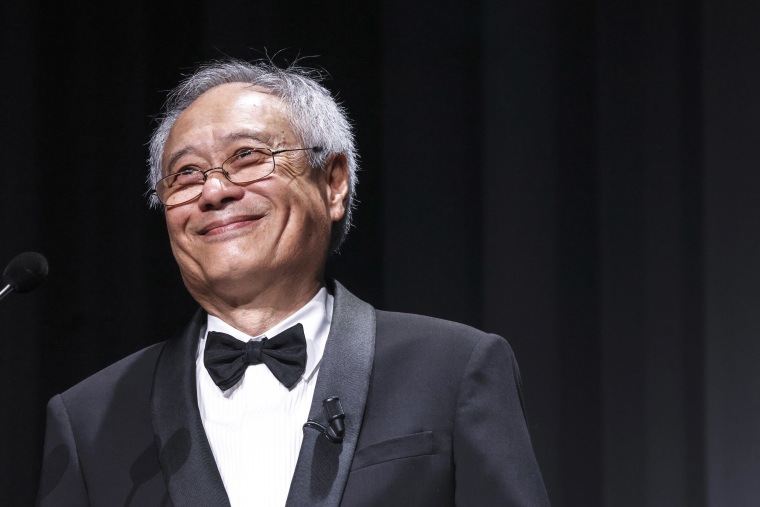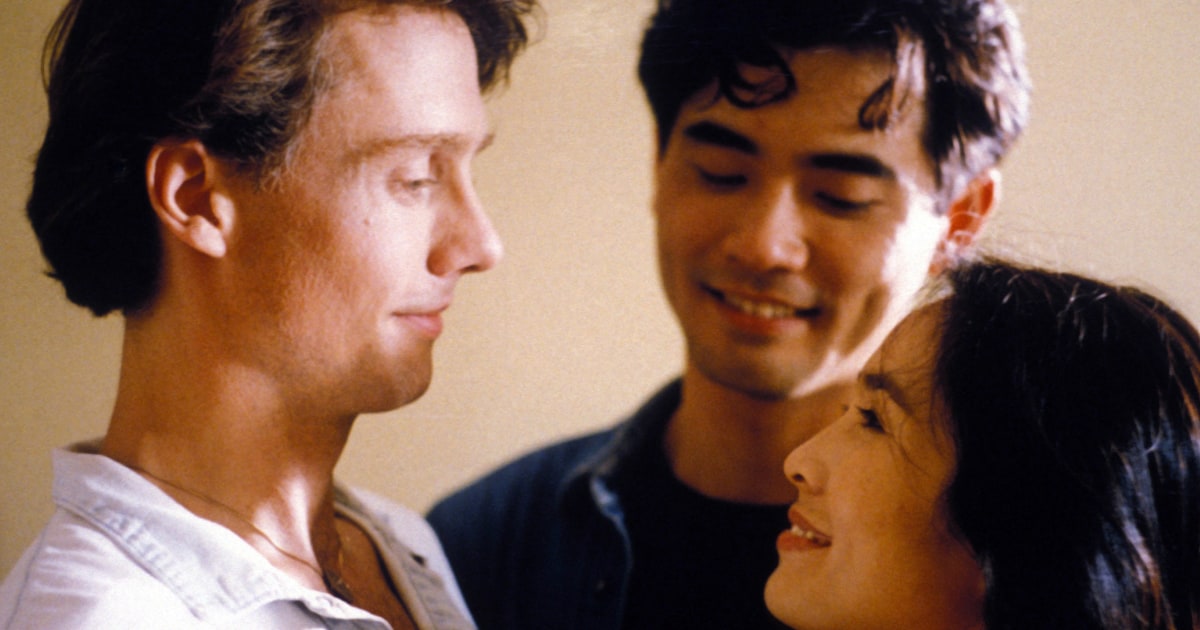Another groundbreaking LGBTQ film has been added to the Library of Congress’ National Film Registry, which has archived more than 800 films of national importance to American culture since the registry started in 1988.
Among this year’s 25 additions is “The Wedding Banquet,” director Ang Lee’s 1993 romantic comedy about a gay Taiwanese man who hides his male partner from his parents as he plans to wed a woman. Other films added to the registry this year include “12 Years a Slave,” “Home Alone” and “Lady and the Tramp.”
“What’s really wonderful about ‘The Wedding Banquet’ is that it is able to share the experiences of immigrants,” said Nick McCarthy, director of programming at Newfest, New York’s premier LGBTQ film festival. “Having representation of the immigrant experience through an LGBTQ+ lens I think really captures the heart of America.”
Lee now has two titles on the National Film Registry, with his groundbreaking 2005 cowboy love story, “Brokeback Mountain,” having been added in 2018. McCarthy said the two fundamentally different films — one about ranchers in Wyoming and the other about immigrants in Manhattan — “make absolute sense” as part of the American LGBTQ film canon.
“There is the whole of humanity under the umbrella of the LGBTQ+ experience,” he said. “Both of those films, I think, show characters that are yearning to live their lives as authentically as possible but may face barriers in an oppressive American ideology.”

Here are some of the most notable films with LGBTQ themes and characters in the National Film Registry:
‘Scorpio Rising’ (1964)
One of the oldest films exploring LGBTQ themes in the registry is described by the Library of Congress as a “rapid-fire exploration and juxtaposition of symbolism and ideas about religion, Nazism, biker subculture, mystique of the underground, gay life and more.”
‘Behind Every Good Man’ (1967)
This short film, running less than nine minutes, captures a day in the life of a Black trans woman in Los Angeles in the 1960s. The film is preserved at the University of California, which describes it as “uniquely honest, offering insight into the experiences of transgender and queer people prior to the Stonewall Uprising in New York.”
‘Portrait of Jason’ (1967)
This documentary delves into the life of Jason Holliday, a gay Black performer and self-described “hustler,” who was filmed for 12 straight hours. Legendary filmmaker Ingmar Bergman reportedly called “Portrait of Jason” the “most extraordinary film I’ve ever seen in my life.”
‘Pink Flamingos’ (1972)
Drag artist Divine earns the title of “filthiest person alive” in this John Waters trash cinema classic about a deranged group of outcasts. The film’s shock value has remained potent and helped earn Divine a place among pop culture’s most influential and provocative drag stars.
‘The Rocky Horror Picture Show’ (1975)
Movie theaters today are still screening “The Rocky Horror Picture Show” thanks to decades of fans who continue to arrive in full costume to yell “Dammit Janet” in unison. The campy film’s cult following has driven its cultural impact as one of the most beloved musicals of the 20th century.
‘Word is Out: Stories of Our Lives’ (1978)
Documentarian Peter Adair sought out regular gay and lesbian Americans for a film that documents their most human experiences: finding love, coming into their identities and navigating life as queer people. It is considered “one of the first films made by gay people about gay people,” according to NPR.
‘Before Stonewall’ (1984)
As its title suggests, this documentary explores LGBTQ history before the Stonewall uprising, a period that is often overlooked by the revolutionary changes that came after the iconic 1969 turning point. The film features rich archival footage of queer icons including Gladys Bentley, Allen Ginsberg, Frank Kameny and Audre Lorde.
‘The Times of Harvey Milk’ (1984)
The documentary, released less than a decade after San Francisco City-County Supervisor Harvey Milk’s assassination, captures the rise of one America’s first openly gay elected officials. Narrated by actor and playwright Harvey Fierstein, the film includes archival footage that captures the heartbreak felt by the Bay Area’s gay community in the wake of Milk’s 1978 death.
‘Hairspray’ (1988)
John Waters’ campy musical, set in 1960s Baltimore, stars Ricki Lake as a self-described “pleasantly plump” teen who longs to land a spot on a TV dance show. The original 1988 film inspired a Broadway show, a blockbuster 2007 remake and generations of fans. The film is perhaps most beloved by queer film goers for the character of Edna, played by the actor and drag queen Divine shortly before his death.
‘Tongues Untied’ (1989)
Marlon Riggs’ groundbreaking film is described by the Library of Congress as “a riveting combination of interviews, performances, stock footage, autobiography, poetry, and dance that elucidates the revolutionary potential of black men loving black men.” The film has been screened and celebrated globally in the decades since its release for its nuanced explorations of racism and homophobia that remain relevant today.
‘Paris is Burning’ (1990)
This time capsule of 1980s New York City shines light on the Black and Latino queer performers who ruled the city’s colorful voguing ballroom world. The documentary, directed by filmmaker Jennie Livingston, includes footage of the iconic Paris Dupree, Pepper LaBeija and Angie Xtravaganza, among other house mothers and performers.
‘The Wedding Banquet’ (1993)
Ang Lee’s newest addition to the National Film Registry is one of his earliest films, a romantic comedy about a gay Taiwanese man, his American boyfriend and a struggling female artist in need of a green card. The film helped put Lee on the map with a nomination for an Oscar for Best Foreign Language Film.
‘The Watermelon Woman’ (1996)
Cheryl Dunye’s autobiographical exploration of Black women in cinema is also the first released feature film to be written and directed by a Black lesbian, according to NPR. Dunye also edited and starred in the film, which explores her own curiosity with Black actresses who starred in early 20th century films.
‘Boys Don’t Cry’ (1999)
Hilary Swank won her first Academy Award for her portrayal of Brandon Teena, a young transgender man from Nebraska who was murdered in 1993. The violent hate crime portrayed in the film felt particularly poignant to audiences upon its release just one year after the murder of gay Wyoming college student Matthew Shepard. In the decades since the film’s release, the casting of Swank, a cisgender woman, as a trans man has since been criticized by some LGBTQ advocates.
‘Brokeback Mountain’ (2005)
Ang Lee’s classic cowboy love story is arguably the most well-known gay romance in cinema. It follows Ennis Del Mar (Heath Ledger) and Jack Twist (Jake Gyllenhaal) as they spend a summer herding sheep on a Wyoming mountain, where they eventually fall in love and forge a yearslong bond.
‘Pariah’ (2011)
This critically acclaimed portrayal of Black lesbian love and friendship follows Alike (Adepero Oduye) and Bina (Aasha Davis), two teenagers coming of age in Brooklyn. Director and writer Dee Rees has said that the film is semi-autobiographical, and that it shaped the course of her career and legacy thanks to its impact on queer fans.
For more from NBC Out, sign up for our weekly newsletter.














You must be logged in to post a comment Login